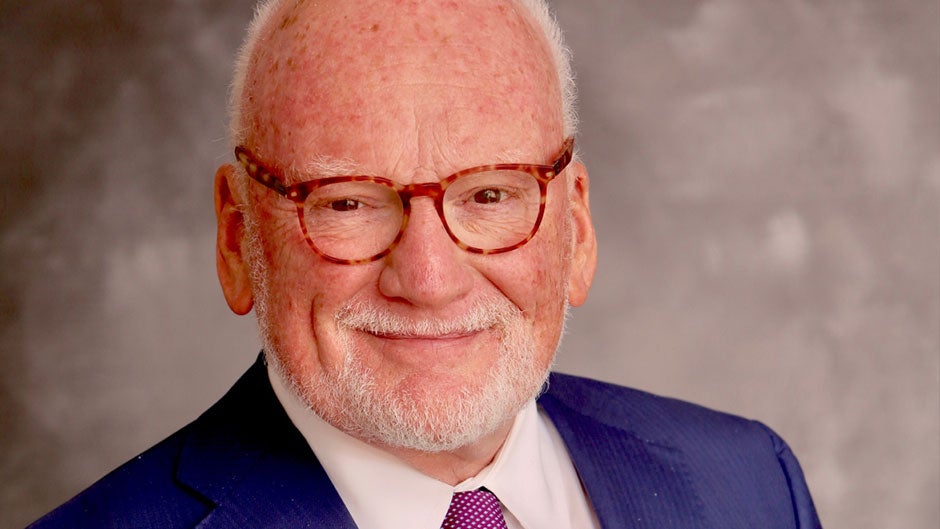Richard A. Clarke
America’s first czar of cybersecurity and counter-terrorism, and author of The Fifth Domain.

Photo credit: Rich Riggens
-
About Richard A. Clarke
Richard A. Clarke is a former key advisor on intelligence and counter-terrorism who worked during the administrations of Presidents Ronald Reagan, George H. W. Bush, and Bill Clinton. Starting in 1998, he also served as the National Coordinator for Security, Infrastructure Protection, and Counter-terrorism for the U.S. National Security Council.
In The Fifth Domain: Defending Our Country, Our Companies, and Ourselves in the Age of Cyber Threats, Clarke and fellow cybersecurity expert Robert K. Knake provide a vivid, engrossing tour of cyberspace, introducing us to the scientists, executives, and public servants who have learned through hard experience how government agencies and private firms can fend off cyber threats.
Upon leaving the Bush administration in 2003, Richard A. Clarke began speaking about his experience and future predictions about intelligence and counter-terrorism. He is an on-air ABC News consultant on political and security issues, and lectures at the John F. Kennedy School of Government at Harvard University. Clarke has appeared on Real Time with Bill Maher, The Daily Show, The Colbert Report, CNN, and more, where he has spoken about cyber war, crisis management, terrorism, the Middle East, and other major political issues of our time. Additionally, Clarke has written several op-eds on these subjects for the New York Times, the Washington Post, and the Wall Street Journal. His 2018 podcast, Future State, discussed the issues crucial to voters in the weeks preceding the election with such high-profile guests as former Secretary Madeleine Albright and former President Bill Clinton.
Richard A. Clarke currently chairs the Board of Governors of the Middle East Institute. He has written seven books, both fiction and nonfiction, including the #1 New York Times bestseller Against All Enemies: Inside America’s War on Terror.
Contact us for more information about booking Richard A. Clarke for your next event.
-
Speaking Topics
The Fifth Domain: Defending Our Country, Our Companies, and Ourselves in the Age of Cyber Threats
Cyber warfare is at the intersection of innovation and danger, and questions loom large about the role of cyberspace in tense U.S. geopolitics with actors like Iran. New technologies have facilitated unprecedented levels of connectivity, but sophisticated groups, including state-sponsored hackers, pose cyber threats for which we have not prepared. Richard Clarke, former U.S. national coordinator for security, infrastructure protection and counterterrorism, takes us behind the scenes with the scientists, executives and government officials at the forefront of developing the technologies and cultures of security necessary to reduce risk.
Testing Tehran (or Tempting It?)
In January, the US and Iran were hours away from war, perhaps the closest to open conflict the two states had come since Iranian revolutionaries took American hostages in 1979. In the wake of Suleimani’s death, Tehran decided not to escalate immediately, but does that mean it will back down over the longer term? Richard Clarke, having served five presidents as a senior State Department official and as an advisor in the West Wing, believes that a war with Iran may still be coming. This could mean serious problems for the United States, including cyber attacks and possible acts of terrorism on its soil.
For over thirty years as an intelligence analyst, policy maker, and counterterrorism official, Clarke tracked US-Iranian relations from inside the government. Now, as Chairman of the Middle East Institute, he is a sought-after expert on the likelihood for and possible outcomes of such a conflict. In his presentation, “Testing Tehran: When and How We Should Do It,” Clarke discusses our government’s ability to manage growing instability and provides a sobering exposition of escalation’s risks.
Silenced Alarms
The Wuhan Coronavirus. The 2008 global recession. The Fukushima nuclear disaster. The Boeing 737 Max’s fatal system failures. Each of these events shocked the world, each was predicted by a credible expert, and each occurred because the warnings fell on deaf ears, claims the man who warned Presidents about al Qaeda and bin Ladin before 9-11.
Whether in politics, physics, or economics, organizations do not independently fail to suspect pending disasters. Decision-makers at institutions of all kinds tend to resist hearing and acting on credible warnings, making crises phenomenological and systemic rather than coincidental and unavoidable. In his presentation, “Silenced Alarms,” Clarke will draw on his 30 years of service to the State Department and White House, on his experiences as a risk management consultant, and on his research for Warnings to reconsider which crises are really inevitable.
Proximity to Power
The first American president Richard Clarke saw was John F. Kennedy, a football field between them in the Boston College stadium. At the time, Clarke did not imagine he would wind up in the West Wing seeing the Commander-in-Chief on a daily basis. Over his thirty years of service, Clarke served five presidents. From negotiating American bases ahead of the First Gulf War, to writing policy on the internet’s threat to critical infrastructure, to quarterbacking the country’s response on 9-11, few have influenced presidential decision-making to the extent Clarke has.
Since leaving government, Clarke has authored nine books, including the international bestseller, Against All Enemies, and his latest, The Fifth Domain. His thousands of pages feature many stories about American presidents, and describe the ways those men made the Office. In the present administration, the Office has made the man. As the 2020 election turns into a referendum on Donald Trump and the sanctity of America’s most defining principles, Clarke draws on his intimate understanding of executive politics to discuss precisely what is at stake in this historical moment.
When It Hits the Fan: Crisis prevention and response
There is a weight one carries while standing in the Situation Room deciding who would and who could not be saved. On September 11, 2001, Richard Clarke carried that weight, assuming the responsibility of avoiding further catastrophe in the midst of an unfolding calamity. As Special Advisor to the President and Coordinator for Security, Infrastructure Protection, and Counterterrorism, Clarke helped manage and avert national security threats for more than thirty years of government service.
As the leader of a security risk management consulting group, he has found that the risk assessment and disaster preparation frameworks Clarke used “inside” to make life-or-death decisions can be applied beyond the West Wing. Be it a CEO deciding to pay ransom after a cyber attack, or TSA executing security measures during a pandemic, Clarke’s presentation will detail how organizations of all kinds currently and can better detect, prevent, and respond to crises.
Terrorism’s Next Wave
“The War on Terrorism isn’t over, it’s just on pause.” That is the stark prediction of the man who warned Presidents about al Qaeda and bin Ladin well before 9-11. Is he right again and, if so, what should we be doing to prevent further disaster? Richard Clarke, former U.S. national coordinator for security, infrastructure protection and counterterrorism, and current Chairman at the Middle East Institute, believes that terrorist organizations will only grow stronger if the political conditions fostering them remain unaddressed.
From combatting Colombian cartels to directing operations from the White House bomb shelter on 9/11, Clarke is regarded as among the most influential and tenured counterterrorism officials to have served the U.S. government. As technology expands the attack surface for extremist groups and amplifies the shocks of terrorist events on the global economy, “Terrorism’s Next Wave” will examine the root causes of violent extremism the global community must consider.
The Laws of Crisis Management
Drawn from his own experience managing dozens of crises in the State Department and the White House, and from his work as an adviser to major corporations, Clarke’s laws are the definitive Dos and Don’ts for any leadership group that could suddenly find itself in the headlights of a crisis.
Terrorism: The Threat Next Time
From the Chairman of the Middle East Institute, and the man who warned America about Al Qaeda and Osama bin Ladin well before 9/11, comes a new warning that neither ISIS nor Al Qaeda is fully defeated. Both can roar back, but there is another terrorist threat even more likely to put America at risk.
Risk Management: Preventing Catastrophe with the Cassandra Methodology
Risk management may depend upon listening in unlikely places for intelligence about impending catastrophes. Drawing on his book Warnings, Clarke reviews case studies of corporate and government leaders who could not see “the writing on the wall” and suggests how to avoid their fate.
The Cyber War and You
Ten years ago, in the seminal book Cyber War, America’s first cyber czar predicted how hacker groups and nation-states would put America’s companies, power grid, and critical infrastructure at risk. Now, that has happened. Drawing from his new book The Fifth Domain, Clarke outlines how to protect our country, our companies, and ourselves.
-
Video
-
Praise for Richard A. Clarke
Praise for The Fifth Domain
A sobering but hopeful exploration of defenses against the weaponization of the internet . . . Clarke and Knake, drawing on interviews with experts, explain cybersecurity’s intricacies in a lucid, engaging manner that avoids the alarmism that often surrounds the subject. The result is a fine survey that will interest policy makers, executives, and ordinary readers alike.
— Publishers WeeklyClarke and Knake, both of whom logged time inside the cybersecurity arms of presidential administrations, have much to say about the ways in which governments and companies have tried to make themselves safe from the legions of hackers out there, from your ordinary black hats to agents of Russia, China, Iran, North Korea, and other entities. . . . The authors counsel reassuringly [that] as companies finally make the transition to more secure systems of transmission, encryption, and data storage, there is hope that the threats of old will one day be a footnote. . . . Largely of interest to policymakers and security experts, though with much for the Wired crowd as well.”
— Kirkus ReviewsCyberspace is the battlefield of the future. Our national security is dependent on whether we wake up and recognize the nature of this threat. In The Fifth Domain, Richard Clarke and Robert Knake are issuing a strong wake-up call. As they conclude, ‘what is missing is national consensus, will, and priority setting.’ If we fail to take the necessary steps to defend ourselves, we may lose not just the battle but the war.
— Leon PanettaIn The Fifth Domain, two of America’s top cybersecurity experts reach a surprising and encouraging conclusion: it is within our power to manage cyber threats. Clarke and Knake offer a wealth of practical and achievable ideas for how the U.S. government, American companies, and private citizens can deter and thwart attacks.
— Susan RicePraise for Warnings
A must read. In an increasingly risky world, finding people who see around corners is key—but once you’ve found them, it’s just as important to listen. We need to listen to Clarke and Eddy, their leadership and vision has been second to none for decades, and they are right again.
— William Bratton, former NYPD CommissionerWarnings is an important book, vividly presenting a way for leaders to make crucial decisions.
— Henry KissingerIn Warnings, Clarke and Eddy turn mythology into sociology and anecdote into analysis in a way that is both enlightening and important for averting catastrophes.
— Garry Kasparov, author of Winter Is Coming and 13th World Chess ChampionClarke and Eddy’s veteran insight will be required reading for those who want to win in a future dominated by technologies and national security threats most haven’t even begun to ponder.
— Senator George MitchellNow, more than ever, you should read this book and learn from two of the very best. A gripping read and a brilliant view of an uncertain future. Clarke and Eddy deliver veteran insights all leaders need to hear.
— General Michael Hayden (Ret.), former CIA directorDick Clarke and R.P. Eddy know what they are talking about-this is not a book about miracles, it is a book about how to recognize warnings in a very dangerous world.
— Leon Panetta, former Secretary of DefenseFascinating. Richard Clarke and R. P. Eddy try to construct a science that separates the true prophets from the fantasists. It’s a fascinating account, and oh, if we’d only paid attention…!
— Lawrence Wright, author of The Terror Years and The Looming TowerPraise for Pinnacle Event
Clarke combine[s] real-life intelligence details with . . . narrative drive . . . will please political geeks and action fans.
— BooklistPraise for Sting of the Drone
What Tom Clancy did for submarines, Richard A. Clarke does for drones.
— David MorrellInsider knowledge of politics paired with amazing state-of-the-art technical details fuel this realistic nonstop action thriller.
— Publishers Weekly (starred review)Praise for The NSA Report
Fascinating insight . . . into how the nation's data-mining apparatus works--and how it's supposed to work.
— Kirkus ReviewsWithin the 300-page report are 46 recommendations that would dramatically curtail the National Security Agency's surveillance powers. While the proposals are specific and varied, they all echo one theme: The government's reach can no longer be limited by technological capacity alone. It must be reined in with laws and institutional reform.
— The Atlantic[The] recommendations take aim at some of the most controversial practices of the intelligence community.
— The Washington PostA remarkably thorough and well-reasoned report calling on the government to end its bulk phone-data collection program and to increase both the transparency and accountability of surveillance programs.
— The New York TimesPraise for Cyber War
Cyber War may be the most important book about national-security policy in the last several years.
— SlateChilling... [A] harrowing — and persuasive — picture of the cyberthreat the United States faces today.
— The New York TimesPraise for Against All Enemies
Against All Enemies is too good to be ignored...It is a rarity among Washington-insider memoirs -- it's a thumping good read.
— The New York Times Book Review -
Books by Richard A. Clarke
-
Media About Richard A. Clarke
Request Fees
and Availability
- 212 572-2013
- Richard A. Clarke travels from Washington, D.C.
Featured Title

The Fifth Domain
“In the battle raging between offense and defense in cyberspace, Clarke and Knake have some important ideas about how we can avoid cyberwar for our country, prevent cybercrime against our companies, and in doing so, reduce resentment, division, and instability at home and abroad.”—Bill Clinton


















